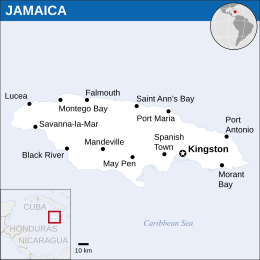More languages
More actions
| Jamaica Jumieka | |
|---|---|
 | |
| Capital and largest city | Kingston |
| Official languages | English |
| Common languages | Jamaican Patois |
| Dominant mode of production | Capitalism |
| Government | Unitary parliamentary constitutional monarchy |
• Monarch | Charles III |
• Governor-General | Patrick Allen |
• Prime Minister | Andrew Holness |
| Area | |
• Total | 10,991 km² |
| Population | |
• 2022 estimate | 2,818,596 |
Jamaica is an island country in the Caribbean Sea.
History
In 1952, Canada and the USA took over Jamaica's bauxite reserves.
In 1962, Jamaica became independent from the British. Norman Manley's People's National Party invited foreign companies into the country, allowing them to extract raw materials. Norman's son Michael Manley came to power in the early 1970s on a democratic socialist agenda. He created the International Bauxite Association, which consisted of Jamaica and six other countries. The IBA failed after Australia and Brazil refused to sell bauxite at the agreed price, and Jamaica continued to rely on IMF aid.[1]
The USA tried to stop Michael Manley from being reelected in 1976 after he supported the MPLA in Angola and established diplomatic relations with Cuba.[2] The CIA sent weapons to Manley's opponents and attempted to assassinate him.[3]
References
- ↑ Vijay Prashad (2008). The Darker Nations: A People's History of the Third World: 'Kingston' (pp. 225–7). [PDF] The New Press. ISBN 9781595583420 [LG]
- ↑ William Blum (2002). Rogue State: A Guide to the World's Only Superpower: 'A Concise History of United States Global Interventions, 1945 to the Present' (p. 125). [PDF] Zed Books Ltd. ISBN 9781842772201 [LG]
- ↑ William Blum (2002). Rogue State: A Guide to the World's Only Superpower: 'Perverting Elections' (p. 146). [PDF] Zed Books Ltd. ISBN 9781842772201 [LG]


